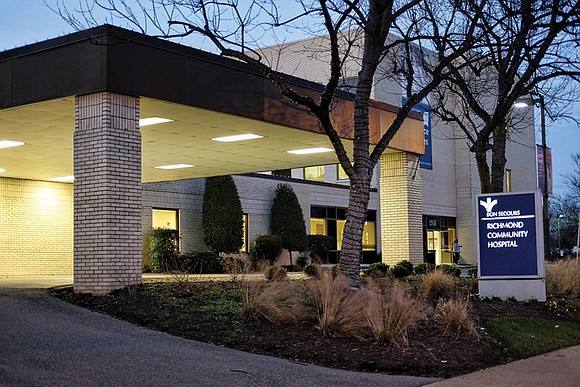‘We can no longer remain silent’
Coalition wants Bon Secours to increase investments in area’s poor communities
Jeremy M. Lazarus | 11/10/2022, 6 p.m.

Sparked by a New York Times expose, a new coalition hopes to rally the East End community to pressure nonprofit Bon Secours Mercy Health to rebuild critical care services at Richmond Community Hospital and better meet the health needs of low-income communities.
An arm of Richmond Together, the 25-member Richmond Coalition for Health Care Equity will launch its lobbying campaign with a community meeting at 6 p.m. Thursday, Nov. 17, at Mt. Olivet Church, 1223 N. 25th St.
The church is just a few blocks from the hospital located at 28th Street and Nine Mile Road.
Clarence McGill, a member of the coali- tion’s leadership team, said the key goal is to generate support for the group’s demands for Bon Secours to change the way it uses huge sums it generates from a federal 340B drug discount program that it benefits from through its ownership of the hospital.
The coalition’s demands include having Bon Secours dramatically increase its investment in the hospital and in health care in poorer areas of the region and put priority on hiring city residents and on contracting with Black- and women-owned businesses and social enterprises.
The coalition was aroused by the New York Times article in September that alleged that Bon Secours had departure of reduced services at the hospital, including shuttering an intensive care unit that led to the heart and lung specialists, as well as other physicians dealing with major organs. At the same time, the article alleged the hospital chain used the facility as a cash cow for its suburban and rural operations.
The article noted that Bon Secours was generating more than $100 million a year in income from a 340B program that allows it to buy expensive drugs for cancer and other ailments at discounted prices through Richmond Community and charge full price to insurance companies at any of its locations.
Bon Secours has stoutly defended its work and its investment to deliver health care to the most vulnerable.
“To suggest that we don’t operate in full support of our important mission is without merit, and we take issue with such baseless allegations,” the company stated in response to the article.
Still, Bryan Lee, president of Bon Secours’ Richmond Community and St. Mary’s hospitals, recently told Richmond-area Congressman A. Donald McEachin, that the community served by Richmond Community Hospital “did not demonstrate sufficient need to justify retaining more comprehensive services.”
The Rev. Benjamin P. Campbell, a former member of the hospital community advisory council, said the council urged Bon Secours to transform Richmond Community into a first-class regional hospital but never got hospital executives to agree. “They paid no attention to us,” he said, preferring to invest in their mostly suburban hospitals.
According to a Bon Secours spokesperson, Jenna Green, the hospital system has increased emergency room and behavioral health services at Richmond Community, but added that VCU Health has a top trauma center located less than 2 miles away from Richmond Community that “continues to serve the higher acuity care needs of residents in the East End community.”
Nonetheless, Bon Secours has not ignored the hospital or the East End community, Ms. Green stated.
Bon Secours is currently investing $16.5 million in a new office building next door to the hospital to expand access to primary care and specialty services.
In addition, she stated Bon Secours has invested $9.8 million in improvements to the hospital since 2012, and is preparing to spend $5.3 million on upgrades, including 3-D mammography and telemetry services and a new suite to house a replacement MRI machine on the campus.
Bon Secours also has provided $18 million in uncompensated care at the hospital, invested $11 million in community supports that impact health conditions, such as affordable housing, job-creating businesses and after-school care, Ms. Green stated.
She also noted that the income derived from 340B has helped offset the nearly “the $330 million in losses Bon Secours has incurred since 2019 in providing physician and clinical services in Richmond.”
The coalition is unmoved.
In a statement issued in advance of the meeting, the coalition stated, “Sadly most of money generated through the 340B program was not re-invested back into the hospital or the surrounding neighborhood.”
The allegation that Bon Secours is “redirecting money from Richmond Community Hospital to subsidize wealthy suburban hospitals and clinics is especially shameful given the history of RCH, which was founded by Black doctors who were excluded from prac- ticing at Richmond’s other clinics,” the coalition continued.
“As community members, we can no longer remain silent when one of our major institutions fails to make good on its moral commitments.”





